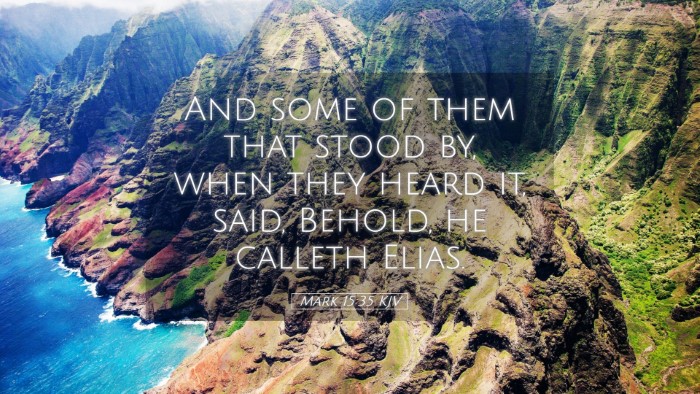Commentary on Mark 15:35
Mark 15:35 states, "And some of those who stood by, when they heard that, said, 'Look, He is calling Elijah!'" This verse is situated in the climactic moments of the crucifixion of Jesus, capturing the poignant and dramatic atmosphere surrounding His final hours on the cross. This commentary aims to explore the theological implications, cultural context, and the depth of the phrase uttered in this passage as derived from several public domain sources.
Cultural Context
Jewish listeners in the time of Christ were deeply familiar with the prophetic tradition, particularly figures like Elijah who held significant status in their religious history. The mention of Elijah connects to the messianic expectations prevalent in the Jewish mindset. According to Barnes, the people’s association of Jesus' last words with Elijah reflects their hope that divine intervention could still occur. He notes that the misunderstanding of Jesus' words reveals a gap between their expectations of a physical savior who would restore Israel and the spiritual salvation Jesus was fulfilling.
Theological Implications
Henry's commentary highlights the irony in this moment. As Jesus calls out, "Eloi, Eloi, lama sabachthani?" (translated as "My God, my God, why have you forsaken me?"), the crowd interprets His lament as a cry for Elijah. This illustrates a profound disconnect between humanity and the divine mission of Jesus. Many in the crowd are witnessing the culmination of salvation history yet fail to recognize the significance of what is occurring. As Clarke puts it, this points to the thematic element of ignorance and misunderstanding of Christ’s purpose, which is a recurring motif throughout the Gospel narratives.
Emotional Landscape
In this moment of Jesus’ desolation, we see the depth of His suffering not only physically but also spiritually. Henry emphasizes that the forsaking mentioned in Jesus' cry represents a profound theological truth—the separation from God that sin brings about. The crowd’s reaction, focusing on a mere mention of Elijah, highlights the tragedy of their lack of insight into the cosmic narrative unfolding before them. They are caught in their misconceptions, illustrating the broader human tendency to look for earthly solutions to spiritual dilemmas.
Intertextual References
This cry of abandonment resonates with Psalm 22, where the psalmist also expresses feelings of God forsaking him. This intertextuality serves as a powerful bridge between Old Testament prophecy and its New Testament fulfillment in the person and work of Christ. Adam Clarke points out that by quoting a psalm of lament, Jesus not only acknowledges His suffering but also positions Himself within the story of Israel, fulfilling the Scriptures that foretold His suffering.
The Role of Elijah
Elijah holds a unique place in Jewish eschatology, representing prophetic authority and the potential for God’s intervention. The people’s assumption that Jesus was calling upon Elijah to save Him reflects a misunderstanding of His mission. Clarke reiterates that the notion of Elijah coming to aid Christ indicates a hope for rescue and deliverance that diverts the crowd from recognizing that Jesus was fulfilling His role as the ultimate sacrifice.
Furthermore, the crowd's proclamation illustrates the ongoing tension between earthly expectations of power and the redemptive work of Jesus that was taking place in weakness and suffering.
Conclusion
The statement in Mark 15:35 serves as a microcosm of the Gospel narrative. It underscores the profound irony of the moment: those who possess a wealth of religious knowledge nonetheless miss the true essence of Christ's mission. In this passage, we are invited to reflect on our own understandings of God and what we anticipate from Him. The theological weight of this moment extends beyond the immediate historical context and prompts deep reflection for pastors, students, and theologians alike.
In summary, Mark 15:35 invites its audience into a deeper contemplation of faith, suffering, and the nature of divine presence. As believers and scholars, we are reminded to examine our expectations of God and the ways in which we see His work manifest in the world around us.


